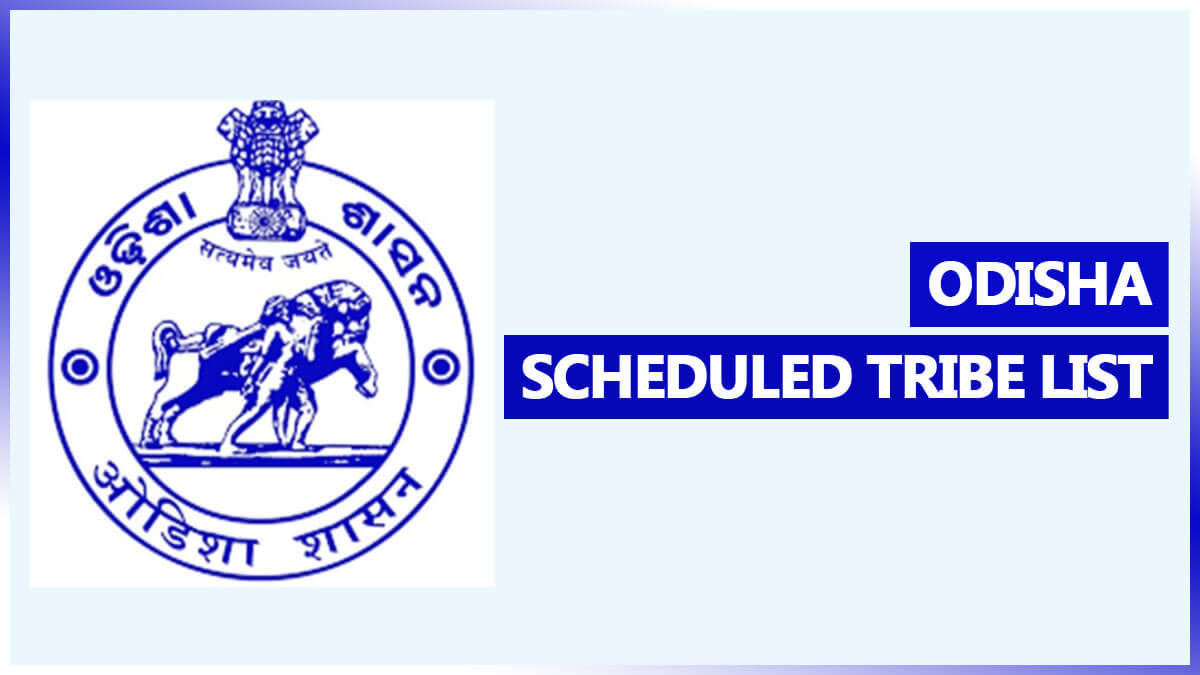
ST List of Odisha State 2022 can now be checked through online mode. Scheduled tribes of the Indian state of Odisha, as recognized by the Constitution of the Indian Republic; a total of 62 distinct tribes. The term “Scheduled Tribes” refers to specific indigenous peoples whose status is acknowledged to some formal degree by national legislation. 13 out of these 62 tribes include are known as “Particularly Vulnerable Tribal Groups” (PTGs).
Officially known as “tribals” or “adibasi”, ST constitute more than 22.5% of the Odisha state’s total population (8,145,081 totally) and 9.7% of the nation’s total tribal population. The Scheduled Castes and Scheduled Tribes comprise about 16.6% and 8.6%, respectively, of total population of India (according to 2011 census).
Here is the list of List of Scheduled Tribes notified (after addition/deletion) as per the Scheduled Castes and Scheduled Tribes Order, 1950 as amended by Modification Order, 1956, Amendment Act, 1976 and The Scheduled Castes and Scheduled Tribes Order (Amendment) Act 2002 No. 10 dated 8.1.2003 of Ministry of Law & Justice republished by the Notification No. 7799/ L dated 7.6.2003 of Law Department, Govt. of Orissa.
ST List of Odisha 2022 – Scheduled Tribes in Odisha
ST list of Odisha is given below in this table:-
- Bagata (Bhakta)
- Baiga
- Banjara (Banjari)
- Bathudi (Bathuri)
- Bhottada (Dhotada, Bhotra, Bhatra, Bhattara, Bhotora, Bhatara)
- Bhuyan (Bhuinya)
- Bhumia
- Bhumij (Teli Bhumij, Haladipokhria Bhumij, Haladi Pokharia Bhumija, Desi Bhumij, Desia Bhumij, Tamaria Bhumij)
- Bhunjia
- Binjhal (Binjhwar)
- Binjhia (Binjhoa)
- Birhor (Mankidi, Mankirdia)
- Bondo Poraja (Bonda Paroja, Banda Paroja)
- Chenchu
- Dal
- Desua Bhumij
- Dharua (Dhuruba, Dhurva)
- Didayi (Didai Paroja, Didai)
- Gadaba (Bodo Gadaba, Gutob Gadaba, Kapu Gadaba, Ollara Gadaba, Parenga Gadaba, Sano Gadaba]
- Gandia
- Ghara
- Gond (Gondo, Rajgond, Maria Gond, Dhur Gond)
- Ho
- Holva
- Jatapu
- Juang
- Kandha (Khond, Kond, Nanguli Kandha, Sitha Kandha, Kondh, Kui, Buda Kondh, Bura Kandha, Desia Kandha, Dungaria Kondh, Kutia Kandha, Kandha Gauda, Muli Kondh, Malua Kondh, Pengo Kandha, Raja Kondh, Raj Khond)
- Kandha Gauda
- Kawar (Kanwar)
- Kharia (Kharian, Berga Kharia, Dhelki Kharia, Dudh Kharia, Erenga Kharia, Munda Kharia, Oraon Kharia, Khadia, Pahari Kharia)
- Kharwar
- Kisan (Nagesar, Nagesia)
- Kol
- Kolah (Loharas, Kol Loharas)
- Kolha
- Koli (Malhar)
- Kondadora
- Kora
- Korua
- Kotia
- Koya (Gumba Koya, Koitur Koya, Kamar Koya, Musara Koya)
- Kulis (Kuli)
- Lodha (Nodh, Nodha, Lodh)
- Madia
- Mahali
- Mankidi
- Mankirdia (Mankria, Mankidi)
- Matya (Matia)
- Mirdhas (Kuda, Koda, Mirdha)
- Munda (Munda Lohara, Munda Mahalis, Nagabanshi Munda, Odia Munda)
- Mundari
- Omanatya (Omanatyo, Amanatya)
- Oraon (Dhangar, Uran)
- Parenga
- Paroja (Parja, Bodo Paroja, Barong Jhodia Paroja, Chhelia Paroja, Jhodia Paroja, Konda Paroja, Paraja, Ponga Paroja, Sodia Paroja, Sano Paroja, Solia Paroja)
- Pentia
- Rajuar
- Santal
- Saora
- Shabar Lodha
- Sounti
- Tharua
ST List of odisha state pdf – Click here
Articles in Indian Constitution for SC/ST upliftment :
- Under Article 46 of the Indian Constitution, “The State shall promote with special care of the educational and economic interests of the weaker sections of the people, and, in particular, of the Scheduled Castes and the Scheduled Tribes, and shall protect them from social injustice and all forms of exploitation.”
- Under Article 17 of the Indian Constitution abolishes the un-touchability.
- Under Article 15(4) of the Indian Constitution refers to the special provisions for their advancement.
- Under Article 16(4A) of the Indian Constitution speaks of “reservation in matters of promotion to any class or classes of posts in the services under the State in favour of SCs/STs.
- Under Article 338 of the Indian Constitution provides for a National Commission for the Scheduled Castes with duties to investigate and monitor all matters relating to safeguard provided to them, to inquire into specific complaints and to participate and advise on the planning process of their socio-economic development etc.
- Article 330 and Article 332 of the Indian Constitution respectively provide for reservation of seats in favour of the Scheduled Castes and the Scheduled Tribes in the House of the People and in the legislative assemblies of the States.
- Under Part IX relating to the Panchayats and Part IXA of the Constitution relating to the Municipalities, reservation for Scheduled Castes and Scheduled Tribes in local bodies has been envisaged and provided.
About SC & ST Development, Minorities & Backward Classes Welfare Department of Odisha – http://stscodisha.gov.in/Communities.asp?GL=abt&PL=3